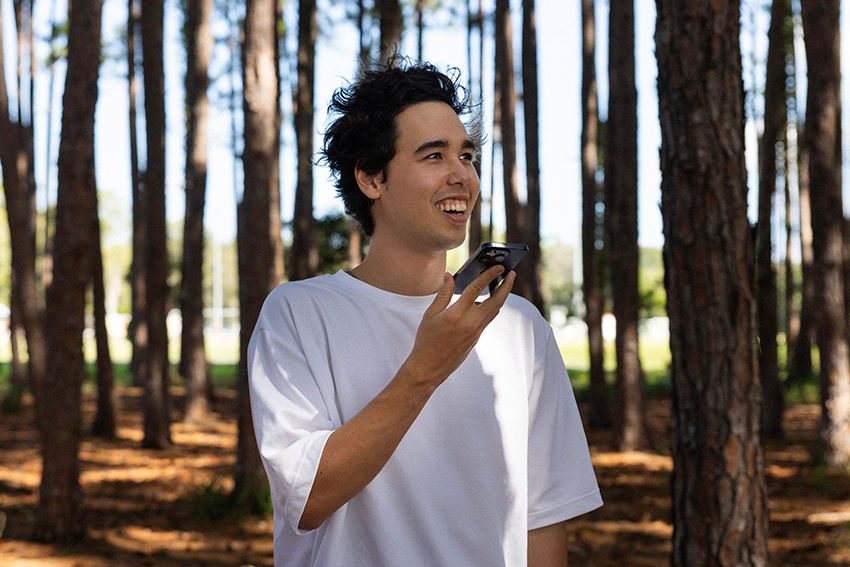In an era where technology is deeply integrated into daily life, the intersection of artificial intelligence and faith raises important questions. Insights recently interviewed Gold Coast-based Australian Leio McLaren, founder and CEO of recently launched app bible.ai, who believes that AI can be a tool for spiritual growth rather than a distraction.
McLaren was featured prominently in national Australian media in 2012/ 2013, when at just 13 years old, he became Australia’s youngest developer to have created the #1 downloaded app on the Apple App Store. Since that time, he has been working with Fortune 10 companies internationally, before developing bible.ai. McLaren says it was his love for Jesus and his love for tech that inspired the new world-first app.
bible.ai, is the first religious app to use voice and virtual AI on a theological platform, providing users with personalised answers based on Scripture and theological sources.
bible.ai combines AI capabilities with theological scholarship. McLaren explains that the app’s responses are built on a foundation of widely accepted biblical scholarship. “We’ve gathered input from hundreds of theologians, pastors, and industry leaders to ensure that our foundation remains deeply rooted in Scripture,” he says. By continually refining its content through user feedback and expert insights, the platform maintains a Christ-centred and theologically sound approach.
One of the biggest concerns about AI-based religious tools is their impact on human relationships. McLaren acknowledges this but clarifies that bible.ai is designed to support, not replace, in-person fellowship. “Our vision is to support and enrich relationships, never to replace them,” he says. The app offers conversation starters, study prompts, and scriptural insights that can be used in small groups, Sunday school classes, and personal Bible studies. For individuals who are isolated or have limited access to church, bible.ai provides an alternative way to stay engaged with Scripture.
McLaren emphasises that technology should point believers back to community rather than pull them away from it. “Ultimately, bible.ai encourages deeper fellowship and points believers toward God’s Word—reinforcing, not replacing, the vibrant fellowship at the heart of the Church.”
As AI becomes more prevalent, concerns about its ethical and social implications grow. McLaren acknowledges the potential dangers, including misinformation and disconnection. “AI can be misused in countless ways—from promoting unethical or harmful content to fostering disconnection and misinformation,” he says. However, he believes that technology can be used redemptively. “Scripture reminds us that God can work good in all things (Romans 8:28). The Church can offer a redemptive response, using AI for kingdom purposes: educating believers, equipping ministries, and extending love and truth into digital spaces.”
Instead of avoiding AI, McLaren sees an opportunity to harness it for good. By leveraging AI to provide sound theological guidance, bible.ai aims to help believers navigate faith in an increasingly digital world.
Many people remain cautious about AI’s role in faith-based practices. McLaren acknowledges this hesitation but encourages a balanced perspective. “AI is developing at an extremely rapid pace and can be intimidating. Yet it’s precisely in these moments of uncertainty that believers can step forward with faith and vision,” he explains.
He believes that if AI has the potential for harm, it also has the potential for significant good. “Through bible.ai, we’re committed to demonstrating how this technology can strengthen the Church, disciple a new generation, and proclaim the Gospel in innovative ways.” The key, according to McLaren, is ensuring that technology aligns with biblical principles and serves a greater mission.
“Rather than rejecting AI outright, we envision harnessing its potential to uplift, to heal and to share Christ’s message with a world in need.”
Recent advancements in AI have introduced devices designed for companionship, such as AI-powered pendants that act as virtual friends. McLaren makes a clear distinction between these developments and bible.ai. “Our focus is on grounding users in biblical truth and enhancing their scriptural engagement—not replacing community or human relationships,” he says.
Voice mode in bible.ai provides a hands-free, conversational way to engage with Scripture, which can be particularly helpful for individuals with visual impairments, dyslexia, or other reading challenges. Unlike AI pendants or chatbots designed for companionship, bible.ai serves as a tool to deepen faith and strengthen ties within Christian communities but also help people with accessibility issues.
“bible.ai is distinctly different to many other general-purpose AI,” he explains. “Our focus is on grounding users in biblical truth and enhancing their scriptural engagement – not replacing community or human relationships. Voice mode serves as an intuitive new way to engage with Scripture – making Biblical learning a hands-free, conversation-like experience. It also addresses crucial accessibility needs, helping those with visual impairments, dyslexia, or other reading challenges connect more deeply with God’s Word.”
McLaren remains firm in his commitment to keeping bible.ai rooted in theological integrity. “Unlike AI pendants or ‘friend’ bots, bible.ai remains rooted in theological integrity and aims to serve the Church by pointing users back to Christ and authentic Christian fellowship.”
As AI continues to evolve, its role in faith-based applications will likely grow.
For McLaren and bible.ai, the focus remains on using technology responsibly, ensuring that it complements rather than replaces the core values of faith and community.
bible.ai is available now on the Apple App Store worldwide. To learn more about all its features, visit www.bible.ai or stay updated with bible.ai on Instagram @bible.ai_app.
Pictured: CEO and Founder of bible.ai Leio McLaren












